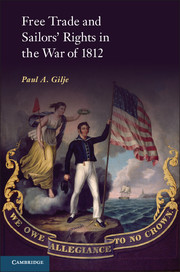7 - Impressment
Published online by Cambridge University Press: 05 March 2013
Summary
Nothing threatened the common American sailor more than being compelled to serve in the British navy. Impressment challenged the rights of American citizens at sea and therefore challenged the American national identity. Throughout the 1780s and early 1790s, the issue of the forced recruitment of American sailors percolated beneath the surface of British and American relations until it burst onto the American political stage in the debate over the Jay Treaty. At that point Republican newspapers became consumed with reporting incidents of the pressing of American sailors, and Republican politicians used this arbitrary practice as an example of British barbarity and perfidy. As Republicans decried the cruelty and “the flagrant violations” of the rights of American citizens, a new word came into use – impressment. This more formal-sounding noun was mentioned in diplomatic correspondence in 1794, but in 1796, during the Jay Treaty debates, it appeared with greater frequency. Indeed, the word was so potent and useful that scholars have seized upon impressment ever since and have applied it to the years before 1796. Impressment implied a policy; the impress or the press – the nouns previously used – reflected more a practice. And as a policy, opposition to or acceptance of impressment during the early republic could be applied as an acid test of patriotism: Americans who might acquiesce in the policy were portrayed as “avaricious tools of a corrupt and corrupting foreign faction.” In the process it became possible to ask, “Is not a Seamen also a Citizen?” and then answer that “the Mariner has an equal claim upon his country with a legislator.”
In many ways the idea of pressing North Americans was merely an extension of colonial practices and, as American politicians came to realize, reflected a denial of the independent status of the United States. In supporting John Jay's first draft of the Treaty of Paris of 1783, British negotiators believed that granting extensive commercial privileges to the United States (an idea quickly abandoned) and permitting Americans to fish off the Grand Banks (a provision included in the final treaty) would not really hurt British interests. In fact, they argued that these provisions would encourage Americans to become seafarers and that these seamen could then become a pool of sailors who might be impressed or recruited into the British navy during wartime, since they already spoke English and would have little to distinguish them from British sailors.
- Type
- Chapter
- Information
- Free Trade and Sailors' Rights in the War of 1812 , pp. 99 - 109Publisher: Cambridge University PressPrint publication year: 2013



